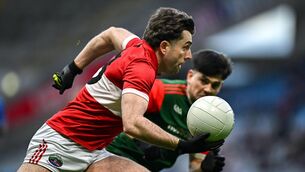Jack Anderson: Shining a light on the GAA disciplinary system

A number of decisions attracted criticism for their inconsistency or leniency and including the proposal by the Central Competitions Control Committee’s (CCCC) to ban Tyrone’s Tiernan McCann for eight weeks for diving during the All-Ireland quarter-final against Monaghan; the Central Hearings Committee’s (CHC) rescinding of the red card Mayo’s Kevin Keane received against Donegal in their All-Ireland football quarter-final; the Central Appeals Committee’s (CAC) rescinding of a red card given to Seamus Callanan which allowed him play for Tipperary in the Allianz hurling league semi-final against Waterford; and the Disputes Resolutions Authority’s (DRA) decision to quash the red card given to Dublin’s Diarmuid Connolly in the All-Ireland football semi-final against Mayo.
In his annual report, the GAA’s Director-General, Páraic Duffy, strongly defended its disciplinary structures noting the majority of players accept their punishments and do not engage with the appeals process.














